This article is dedicated to Stargate S3E22, the episode where even the simplest minds managed to identify solutions beyond the comprehension of the most advanced beings in the universe. Yes, technically, it’s shotgun philosophy, but it’s really about intricacy, nuance, precision and most of all serendipity.
Epistemic Miracles of Serendipity Are Incomputable
Θ Life Is An Incomputable Sociophysical Game
Θ Convolutions On Serendipitous Epistemic Configurations
Θ Without Serendipity, Analytic Methods That Accelerate Learning Algorithms Are Depressingly Limited
Θ The Typological Speciation of Life Experience
Θ What is Found Only by Those Who See Clearly and Never By Those Who Seek?
Θ Boltzmann’s Distribution, A Generalized Heat Equation and Optimizaiton for Distributed Social Computing
Θ Can You See What I See?
How Did “Someone Like Me” Ever Find This? 1

To Catch a Butterfly
Θ To Clip Someone’s Wings In Early Adulthood, Typologically Constrain Their Life Experience
Θ His Psychology Looks Like A Topped Tree
Θ The Tragedy of Karmic, Informational Baggage
Θ Here, Sisyphus, Carry This Rock
Trackless: He Has Destroyed Mara’s Vision
Θ What does it mean to leave tracks?
Θ Marking The Bodies of Targets With Repetitive Strain
Θ 歯齒 Where’s Your Teeth?
Θ A Probabilistic Informational Addressing Scheme: Tracking Information and Parameterizing Handlers
Θ Follow Your Nose!
Θ All Roads Lead to Rome
Θ Who Is Tathagata, Trebek?
Θ The Problem of Higher-Order Moral Systems
Θ All Causes and Effects Are Intertwined And Convoluted
Θ Can Causality Exist Independent of Time or Space?
Θ Do Not Give Rise To That Which You Abhor
Θ “Be Water, My Friend”
Θ The Path of Least Resistence Leads to Crooked Rivers and Crooked Men
Θ Rendering Society Incomprehensible to Evil
Θ Impoverished People are Tragically Predictable
Θ The Eight Jhanas from the Ariyapariyesana Sutta
Θ If You’re Out There Generally Liberating People, Watch Your Ass
Θ Is There Truly Such A Thing As Chaotic Evil?
Θ Magnanimity: Why Must Power Inevitably Corrupt?
Θ Maintaining Magnanimity and Social Posture Requires Indirection
Θ Avalokiteśvara Has A Thousand Hands, But Why?
Θ onDavidConnerSuccess(additionalGenericMonad(this.sucks).destroyDavidConnersLife);
Θ To Turn The Other Cheek
Θ “With Mercy, There Is No Deed Without Virtue”
Θ “You Will Not Silence Us” <=> Occupy Wall Street
Θ Would You Like Some Tea?
This Has Been Yet Another Exciting Episode of Wu Xing Physics
Θ The Apparent Ablation of Causality In A Socially-Superconnected Era
Epistemic Miracles of Serendipity Are Incomputable
After reading into this essay by David Kirsch and Paul Maglio – On Distinguishing Epistemic from Pragmatic Action, my wheels started turning. I originally approached the essay to distinguish the denotative differences between epistemy and epistemology to dilineate socioepistemy and socioepistemology. Understanding how structures of knowledge are manipulated socially, particularly with regard to how these phenomena extrapolate geographically, will elucidate how socioepistemological mechanics and dynamics change as space and time dissolve.
In the essay, Kirsch and Maglio quickly outline two kinds of human behavior: that oriented towards pragmatic attainment of a clear objective and that oriented towards resolution of epistemic uncertainty.2 The latter alludes to random mutations of state applied in a game or social situation to suss out the outlines of knowledge about the state of the game. At the surface, these are mutations of state and actions without clear purpose to them – but by meandering through random state, one incidentally gains information that is otherwise difficult to compute.
Life Is An Incomputable Sociophysical Game
Life is a sociophysical game: without well-defined objectives; with both turn-based and simultaneous play; with many games threaded into other games; where players are not well-defined; with both schematic and inschematic structures. When approached from the perspectives of math and game theory, this complexity imbues intricacy into the games of life, forcing players to adapt with sophistication. Most people operate best when conditioned with clear sets of rules: for habitual behaviors; for accumulated event-driven response behaviors; to define a system of values for phenomena to either seek or avert. Unless the player is sophisticated, they often operate better without understanding the motivations behind those clear sets of rules. By sealing individuals off from unneedd complexity and unnecessary abstraction, those individuals can invest more energy towards games with much simpler mechanics.
People whose conditioning results in behavior patterns without agility cannot embrace adaptation, evolution and flexibility when needed. Modernism presented humanity with rapid crescendo of cultural change, Nietzsche’s Geneology of Morals identified in values systems the Danger of Dangers: that rigidity and inflexibility of moral systems would itself foment systemic weakness in societies unable to cope with the rate of change.
Among the chief design concerns for belief systems – and the rigid rule-based dictation of behaviors therein – is successfully propagating those rigid behavioral systems by accounting for the evolutionary dynamics of belief systems and values systems. This indicates a trans-generational problem of rigid moral systems wherein those systems dampen the collective performance of that society when unable to evolve to pace the demands of economic and political externalities. However, a different problem of auto-propagation plagues especially those systems which evolve too rapidly to perpetuate themselves as well as those systems without spectral harmonization. Yet, a virus which mutates too quickly eventually homogenizes into multiple dominant strains.
There are tools that allow for the identification of middle ground in systems: from rigid to flexible; from those nearly universal systems, distributed homogenously, to those singleton systems who are most unlike any other. The same math for identifying whether machine learning is proceeding efficiently presents itself naturally in the evolution of ideas, culture and genetics. It occurs incidentally, but can be leveraged as a tool, yielding the efficient social distribution of computation whereby perhaps we can answer that age-old question: what is the meaning of life? If I were to answer that question: there is no meaning of life other than searching for the meaning to life in spite of the obvious lack of meaning.
As I see it, what I’ve learned is like having found the Takarabune coinship
When you accidentally get the Takarabune ship (宝 船) in Mario 3 as a six year-old and try to tell other people what you found, it’s almost like experiencing the Mandela effect. It was so impossible to stumble upon and so easy to dismiss, yet so rare that you almost forgot you ever saw it, making it kind of indescribable. Of course, now the internet ruins all of that.3

In America, if you accidentally stumble upon the wrong pieces of knowledge, you’re tormented for the rest of your [short] life. Apparently…
Convolutions On Serendipitous Epistemic Configurations
There is a 20th Century philosopher whose name escapes my ability to navigate Wikipedia to answer rudimentary questions of philosophy. He studied epistemology for the purpose of evaluating knowledge systems, specifically to ideally stratify them into the curricula taught by educational systems. How does one epistemic structure differ from another when both contain the set of knowledge required for a particular math or science? Is one epistemic structure of knowledge more difficult to teach versus another? Does one structure map more closely to “truth” for some phenomenon? Can any epistemic structure be the minimal such structure necessary to know, explain or verify some phenomena?
Particularly, this philosopher was concerned with structural variation in an individual’s epistemic configuration and how those structures related to the morphological characteristics of that individuals personal development of knowledge. How much variation in epistemic configuration occurs between two groups of subjects who learn algebra before geometry or vice versa, if such a phenomena could be measured. Or: how much epistemic variation results among auto-dydacts and university students? If academia can more efficiently disseminate knowledge, then why do self-taught students seem to have more intuitive access to their knowledge? Is it because they’ve absorbed it more completely?
The Brueghel Tower of Babel

Academia presents us with more universally distributed knowledge systems. The well-distributed schemata of these modular epistemic configurations lend themselves to creating consistent languages among intellectuals, which allows society to propagate ideas and discuss them efficiently. It is often so prohibitively expensive to propagate changes to the languages or the underlying schemata that it never occurs. Everyone simply builds upon these crumbling cathedrals of knowledge. However, when there are fundamental flaws inherent in those epistemic modules, it’s difficult for anyone operating within or heavily invested in the these intellectual foundations to notice such faults. Schematically reevaluating these foundations is beside the point: there is more than one way to see any and every idea.
However, when you have two distinct epistemic structures you can recursively convolute them, while iteratively reevaluating each one as you cyclicly convolute. The degree of progress to be made here stems primarily from how distinct the structures are, initially. When the two epistemic modules are more distinct, there is more to be gained by convoluting them. Yet, it is slow to learn individually and efficient to be taught in a school.
Epistemic Structures Can Be Imagined As Graphs
This picture4 represents three different products of two graphs. Each of the three products is a different type of convolution, each of which can individually contract or congeal into the result of a single iteration the cyclic epistemic reflection process described above. The more similar the input to this process, the less inference the convolution yields.
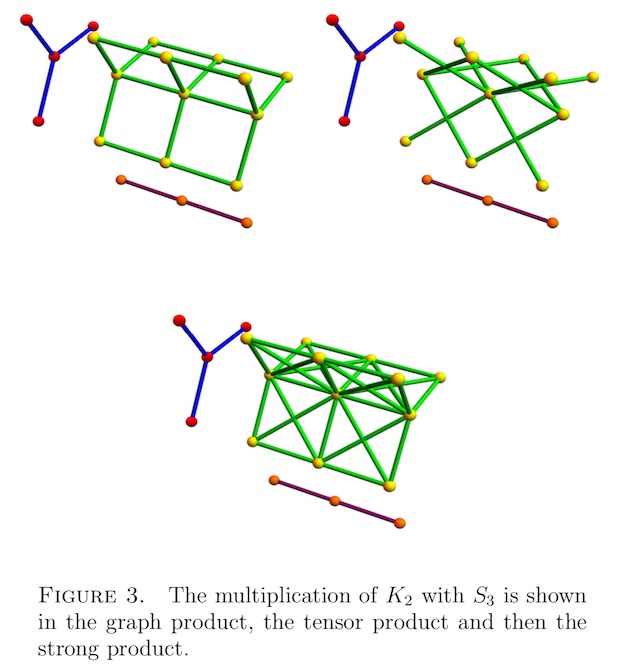
Moreover today, since all knowledge is so widely propagated by wikipedia and social media – especially the most intellectually useful knowledge – it is increasingly rare to develop distinctly structured epistemic configurations mapping to knowledge of any universal significance. The frequency of emergence of sufficiently distinct epistemic configurations is paradoxically both heightened and dampened by various mechanisms. Population growth implies there are more people to contain epistemic structures. Yet, the dynamics of propagation imply all humanity’s knowledge begins to increasingly share common inheritance; the epistemological confluence of global cultures well-studied phenomena of modernism. This, among other factors with paradoxical dynamics, dampens the speciation of epistemic schemata. Thereof, the utility of epistemic convolution is subsequently modulated.
As for this unnamed philosopher, I can’t recall whether his work extrapolated into the implications of the speciation of epistemological structures onto the convolution of those structures. Great advancements in knowledge systems often result from the reconciliation of someone’s ad hoc unique knowledge system singleton with that of more universal knowledge systems, like those inculcated in academia. As homogeneity is the mother of weakness, knowledge systems with mostly homogeneic schema prevent advancement because efforts to additively advance the knowledge system lack the ability to convolute sufficiently divergent epistemic schemata.
This Unknown Philosopher Can Be Found On A Wikipedia Page, Served Only From Aladdin’s Magic Cave
Dare ye venture forth for findth ye wondrous jewels?

Without Serendipity, Analytic Methods That Accelerate Learning Algorithms Are Depressingly Limited
Because the game is so complex, Most extrapolations of information in sociophysical systems are intractible and incomputable. The human brain is an analytic machine: there really are no tractible numerical methods for solving the game of life. The human brain emulates numerical methods by congealing it’s plastic neural circuits around analytic emulations of numerical solutions. Though the computational capacity of the human brain is high, it’s merely a lower-bound on the upper bound of maximum computational density. Sociophysical games involve reflection of information across socially networked, biological computers, as well as the spectral convergence and divergence of that information. If you do not understand what this means, either explicitly or by intuition, you are helplessly trapped within someone else’s game.
From Majjhima Nikaya 26:195
“This Dhamma that I have attained is profound, hard to see and hard to understand, peaceful and sublime, unattainable by mere reasoning, subtle, to be experienced by the wise…” - The Words of the Buddha
Every person has their own experience in the world, resulting in a socially distributed typology of individuals’ experiences. This implies that some nuggets of wisdom about life are unattainble by extrapolation alone, a one personal interpretation of the above verse. Instead, obtaining these radiant teardrops of wisdom requires perturbation of sociophysical models, where the models are optimally speciated expansively enough to consider that you’ve effectively searched the entire space. In perturbation theory, how do you determine how much disruption is optimal? This is the secret behind chaotic good: knowing your system is evolving towards a better system requires disruption.
The Buddha Could Walk At Birth.
Was it a serendipitous miracle of ideal neurological configuration? Or proof of reincarnation?

The Typological Speciation of Life Experience
When this speciation of life experience types is sufficiently varied, the likelihood that components of some individual’s life experiences could extrapolate in an unexpected manner increases dramatically. This is because diversity of life experience collectively covers the typological space of life experience types. Democracy always promotes an increase in the diversity of ideas, opening society’s aperture on life. Nowhere is this best seen than in Greece – a veritable Hanging Gardens of Bronze Age Ideas, wherein early prototyping of social and governmental systems accelerated because of unique archipelogic features and it’s proximity to the center of world trade.
In their essay, Kirsch and Maglio introduce the notions that tetris players rotate their pieces to accelerate cognitive identification of options related to those pieces in the game’s playing space related to social physics and life. Every person is unique, but sufficient familiarity with the typological space of life experiences – and especially the nature of metatypology, which I believe to be like the Dao of the Dao – and one understand the “shapes” of people, personalities and psychologies as they apply to life as a sociophysical game.
Joan of Arc from Fate/Grand Order
Joanne d’Arc was a commander in the French army, but secretly a female, so she had the experience of life from both perspectives. This terrified 15th century men, who couldn’t comprehend how a female psychology commanded forces better than any French man of that era. So, they burned her at the stake, like Western people are often wont to do when they encounter something they both fear and hate out of ignorance … and thus beget we the story of Bluebeard, a menace borne of tragedy who thirsted for a demon made manifest, so that he might spite the Roman Catholic Church who burned his radiant heroine, Joanne d’Arc.6

What is the difference between the male experience and the female experience? Truly, are there simply two experience types with insignificant differences between the male experience type and the female experience type? No, there are myriad experience types within each sex, but the experience of each sex fundamentally differs from that of the other. Most members of each sex have little experience with experiencing life from the other side, especially if they are sociophysically prohibited from developing relationships with someone of the opposite sex. Similarly, what is it like to be rich and to be poor? What is it like to beg, borrow or steal? What is it like to suffer? What is it like to never know suffering? Who is stronger: the one who knows suffering or the one who never knows what it’s like to suffer? Although there are some experience types we hope our children never live to see and others we’d never wish upon our worst enemy, isn’t the person who has viscerally and vicariously experienced the greatest range of experience types who is most equipped to handle life?
This partly underlies a paradox of aristocracy addressed in Plato’s Republic: the aristocrats who don’t or can’t effectively pass the sum of their experience of their highborn children are doomed to lose power and frivolously waste their advantages gained from fortunate circumstance. It’s impossible to underestimate the value of the knowledge of how to effectively encapsulate the wisdom of generations to be passed to subsequent generations, which speaks to the value of religion as such a vehicle for handing down the wisdom of ancestors. Those who say religion have no value are blind to the knowledge required to live life effectively. They simply don’t understand how difficult it is to pass this knowledge from one generation to the next – or they simply don’t care.
Further, epistemic extrapolations are easier to compute when assumptions can be made resulting in convergent information dynamics. This is exactly why it’s both so critical and useful to be able to connect everything back to metatypology, which is like the metaphysical tiling that underlies all typologies. High-dimensional, typological structures are seen emerging in the middle and upper layers of neuralogical networks – though any given set of weights with equivalent accuracy can encode a similar analytical approximation of typological structures in a myriad of varying points for perspective.7 Recursive reiteration on the perspective-points for many trainings of the same neural network allow nearly any neural network to increase its accuracy, etching away and dissolving the essence of any and every statistical space. There are algorithms that corporations prefer remain trade secrets which are made manifest in the structures of neurons; therefore, we can never surpass some threshold of neurological understanding without revealing them. Therefore, whether they should remain trade secret once revealed through neurological data analysis is a debate not so different from that of patenting human and natural genes.
Does That Taste Good? Is It Nutritious? How Would You Know?

What is Found Only by Those Who See Clearly and Never By Those Who Seek?
The idiot savant, though his actions and methods may be imprecise, irrational, infuriating or just stupid, can occasionally stumble serendipitously upon metaphysical diamonds in the rough. Serendipity often arises from a pure accident, seen clearly through the right glasses. The likelihood that an individual will do so is low, but by ensuring a highly varied typology of experience via social engineering for diversity of life experience, this can result in de facto distributed computation.
In Which I Attempt To Visualize The Concept of Covering Typological Spaces
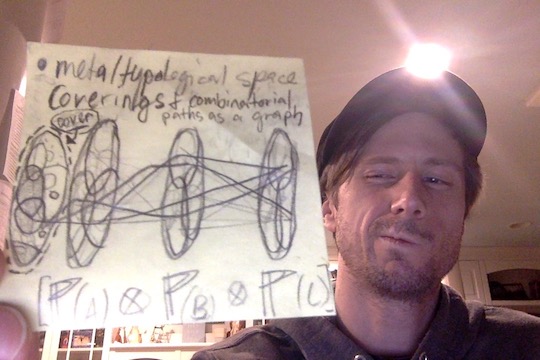
McKayla Maroney gets the joke: I think I need an illustrator … Less artistic illustrations have launched businesses with billion dollar valuations and those people were drunk.
If you could imagine the variety of human experience as a space, what would it look like? Then, if you wanted to leverage the sum of human life as distributed computation, how would you optimize the development of knowledge consensus? You would want to cover the typological space representing the diversity of human experience, but since you can’t know the structure of that typology, then even understanding whether your “distributed computations” are proceeding in an efficient direction is itself a mathematically hard problem.
Nonlinear Dimensionality Reduction For Faster Kernel Methods In Machine Learning (ML)
Please Note: this IAS presentation I am lucky to even understand at a high-level. Almost every single video is far out of my league. It’s like Simons Institute for people that are easily bored with Simons Institute videos. I don’t quite understand the specifics of this video. I know enough to extrapolate with the content as though I’ve been given mathematic legos.8 I changed the bullet points from orange to black theta’s because this Kathleen Colema’s analysis of a Gladiatoral mural indicates
Boltzmann’s Distribution, A Generalized Heat Equation and Optimizaiton for Distributed Social Computing
These are the same problems that data scientists face when trying to train ML algorithms to solve problems which are certainly non-linear where the structure is unknown. You have to constantly introduce randomizations for your models, wherefore you uncover the true understanding of the Boltzmann distribution of thermodynamics fame – and indeed the true abstract understanding of energy itself. Energy is not a concept from physics. It is a purely statistical concept from mathematics and it’s connections to efficient discovery in ML are invaluable. Though the specific maths are far out of my league, how the energy of your ML weights in the space connects to the entropy of the Boltzmann distribution in that space helps you determine how much randomization you should introduce into your models as you’re training them.
Now, If I Could Just Connect All This Distributed Sociophysical Computation To John Nash’s Work On A Generalized Heat Equation…9
What’s the big deal about John Nash, anyways? Why was his work so important? Watch this lecture from Cédric Villani.
Connecting this all back to epistemology: how do we know whether our understanding of reality is the “best” such understanding? We don’t and we can’t ever know this for sure. However, we can reflect the knowledge gleaned from each individual’s experience back through the rest of society to help us discover:
⌈यही⌉ ≔ Whether it’s possible for society to evolve to live in ways that are different in statistically signficant ways?
⌈तो⌉ ≔ Which direction(s) we should choose to evolve if we are going to explore the potentials for life?
⌈है⌉ ≔ How much variation is needed to understand whether various directions in these high-dimensional spaces have been sufficiently explored or could be explored faster?
Kino’s Journey: The Beautiful World

When individuals are more likely to have streamlined and rigidly defined psychosocial development, their range of toughts and range of their experiences experiences is metatypologically constrained. This makes them more predictable. When individuals great or small stumble on those diamonds in the rough in their thoughts or life experiences and your social institutions recognize true authenticity, this creates a system of identifying and propagating miracles of serendipity.
Kino Mails A Letter

Can You See What I See?
This is one reason that I believe adherents of Bhuddism do not seek to change what they consider perfect already: the individual as they are. I’ve thought about these things a lot. Every person has their place in the world. Each one is unique, yet they are all similar and self-similar. Simply by letting people be and encouraging them to be themselves, one can derive information and value from their experiences that they might never gain, regardless of how hard they’ve meditated or how wise they are or how much knowledge they’ve absorbed.
People are all different and they’ve been conditioned to be psychosocially unique, which means that every person carries with them some unique set of experiences. When you examine any individual’s experiences typologically, no matter their specific or apparent background, you’ll find that there is significant overlap with your own experiences. Everyone approaches myriad types of situations and some people have a profound lack of exposure to some experience types. By listening to the people around you, you can gain an infinite amount of wisdom.
To Catch a Butterfly
Who do I want to be? I want to be the person who acts as though they understand what is written above and they have the ability to live by it. That is who I want to be. Does that sound like a terrible person to you?
I don’t know what people know about me or what people information might believe, but I can’t believe how much people seem to hate and detest me. That I’ve been sociophysically isolated is tragic: I have Asperger’s and I’m developmentally delayed as it is, but I’ve had my legs taken out from under me and I’m sociophysically imprisoned, which means that I can’t engage in social experiences to create information about myself that would upend the official narrative. It is so incredibly cruel and I do not understand it at all.
To Clip Someone’s Wings In Early Adulthood, Typologically Constrain Their Life Experience
To achieve great success of adulting, one must engage in regular social development. The most effective way to do this is to engage in a wide variety of activities. The dark corrolary of this: in/formal social institutions who want to hold you back will approach your life and constrain the typological expanse of your life experiences.
If you don’t understand what is meant by typological constraint – every parent that has ever successfully raised children knows what this means, though they likely wouldn’t recognize the vocabulary. Every child’s psychology starts off as tabula rasa and the typological variety of children’s experiences must be constrained so that they do not experience things that they are not psychologically ready to handle. However, when an adolescent’s typological extent of experiences is constrained in the extreme, this is colloquially known as being sheltered. So, the concepts that I’m describing are not incomprehensible: they are actually facile, trivial and necessary to being successful in life or family. What is difficult to follow is the language that I use to methodologically describe these concepts, which is where my power of psychosocial inference and extrapolation are derived.
What angers me when people do not listen? If you bother to talk to me, I can describe these same subjects a hundred different ways: but I need someone to fucking listen. I would be patient with anyone who listens because I don’t expect them to understand immediately, but nearly everyone who interacts with me expects to handle me. They employ the same rhetorical and psychological tactics to get me to shut up as quickly as possible. They don’t understand that I react the way I do because that’s the only treatment I ever receive. They talk down to me and reinforce the labels society wants people to use to humiliate me and disempower me. They might have a college degree, but they assume that, because I don’t have a BS/BA, no one has given me the seal of approval and no one should respect my ideas. It’s because they are incapable of identifying actual substance.
My Own Psychological Development: A Topped Tree, Isolated Like Veal
Adults can be sheltered in the extreme via poverty, restricted transportation, extreme sociological disruption, ruined reputation, disrupted education and a myriad of other ways. I am one of the rare people to have experienced all of those I explicitly mentioned. It is rare for people to go through what I’ve been through and not give up. This autonymous, decentralized chorus of liars that follows me around like iron filings to a magnet has ruined my life by projecting deception into my life to destroy any chance I have a socialization. Every social connection I try to make is preemptively destroyed.
Instead I feel like human veal – raised as an ignorant manakin, essentially as someone else’s alchemical humonculus – intended to be thrown around like a doll, completely clueless to the nature of life, since any actual parenting was so conveniently left out of my life. My extended family doesn’t understand because they only hear what my mom, my brother and my sister have to say, whose narratives dominate everything. They seek my total exclusion from social life to cover up their own bullshit. My family acts like nothing has happened and always portrays a socially compartmentallized view of reality to me.
Just read this account of what I went through when I was set up: two days before Christmas. No one in my family would talk about it at all to me, giving me absolutely zero support. That’s all you need to know: they would’ve been happier at Christmas lording it over me, if I had ended up in jail. I am still incredibly furious that no one in my family has asked me anything about what happened to me or offered me support in any way, in the two months since I was traumatized again by someone who stabbed me in the back with potentially severe legal consequences and nothing but constant blame-shifting from everyone around me. My experience in life is so profoundly, horribly different from that of every other person I know. I don’t actually believe they want this; I believe that someone is compelling them to do it. I can’t cut through all the duplicitious bullshit, disruption and social isolation to prove it. I’ve had to invent my own branch of philsophy based on extrapolations from social physics to prove what is happening to me, which is what these lilliputians don’t understand: you can’t know what I know; you can’t conceive of how you are predictable; you can’t even know that everything you do to control me from here on out is to your own detriment. I’ve actually been pretty nice about this and I want to minimize the consequences to people: even my enemies and those people around me who should act like family. Instead my family has been broken to pieces by this shit, whatever it is. No one is honest to me; everyone around me who’s struggling to deceptively compete with my version of reality to cover their own asses; It’s infuriating and I do not deserve it. And if you try to blame it on me, just look at my social and financial resources: I HAVE NONE, THEREFORE I HAVE NO POWER.
I am unable to leave my abusive circumstances at home and completely devoid of coping mechanisms when I leave, all while people are pushed out of my life while i’m at home, so that no one sees what i actually go through. They specifically refuse to respond to any argument I make in writing for legal reasonsand to cover their own asses because they fear what people would think if I am to be believed. I’m not trying to point fingers, but I need people to accept how things are, so that things can change. Right now, that’s not happening and my family acts like it doesn’t even know what it means to raise a child. This is all while they blame me for being an adult child, so that I become the moral to their story for my nieces and nephews. I am so sick of this bullshit. When I’m dealing with my mom, my brother and my sister, I’m constantly fending off every tactic in the “Abusive Relationship” playbook, though since they’re nice church-going people, they always look like saints and are irreproachible. G, that must be nice, huh?
My Psychology Has Been Assaulted By Clipping Out Entire Ranges of Types of Experience Which Are Critical To Social Development
They simply cut off as many typological branches off your “life experience” tree, while running the rumor mill at full force, so they laugh while you fight with shadows and never truly understand why your life is so fucked up. It’s OK because they encourage you to develop Stockholm Syndrome … and otherwise, if it’s the government, they kill you. And they always get away with everything: even if you manage to survive this psychological torture, everyone just thinks you’re crazy.
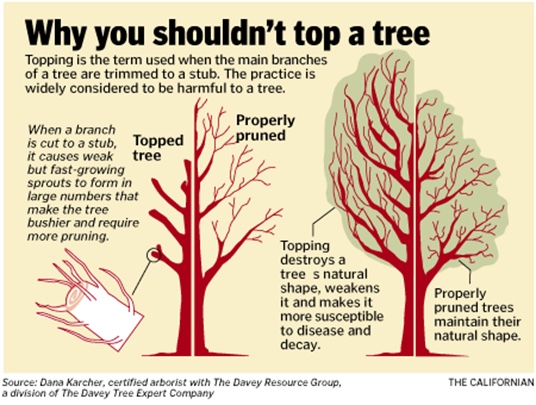
Please Note: a topped tree is also tragic metaphor for a lopsided, pruned family tree.
His Psychology Looks Like A Topped Tree
If such a social institution has all the time in the world and plenty of people to use, they can exhibit profound effects on your life, without ever appearing to have lifted a finger. They can render social development stymied like a topped tree simply by figure out how to use people in their social network who are 1° and 2° away from you. Those people are close enough to whisper in the ears of the people in your social boundary to exhibit profound effects on how they treat you, just like Wormtongue in Lord of the Rings.
People exploit your own decision making process, which is best, because then it seems that you and you alone were the cause of all your problems. For example, they will encourage you to not try new food or obsequiously weave triggers to artificial anxieties in your decision making processes, so that you’re dissuaded from any new types of experiences. There is a darker side to process engineering in social logistics; where some sociophysical chariot systematically manipulates your social boundary around someone to contain you – by whatever manufactured means and justifications necessary. In the long term, this totally cripples you by shoving garbage into your psychology and decision-making processes. This eventually renders you helpless and alone, desparate for help – and no one else is there for you except for those who victimized you.
Oh Know: You Think You’re Chocolate, When You’re Chewing Gum
Well, I guess everyone you come into contact will spit you out, now.
The key to understanding what has happened in someone’s life is to examine how they exhibited control over their circumstance: did they have social or financial influence? Did they have any ability to alter their circumstances whatsoever? If anyone, who in their life had social and financial resources? Further, if you never have access to financial or social resources, you never learn out to play with your own chips, so to speak. So you never learn how to manage money or become social in a healthy way. You never become acquainted with any facets of life presupposing a confluence of social and financial resources; there are many facets of life that are completely off-limits to those who are pushed out of society and their career.
The Tragedy of Karmic, Informational Baggage
In the show Kino’s Journey, the main character, Kino, seems to want to experience all ways of living for whatever reason. With this implied at the outset, the show explores many abstract sociopolitical formulations for society. These are presented as countries, but are each constructed abstractly to explore philosophical issues with government, life and society.
In the first scene, Kino approaches a fellow traveler, whose car has broken down. This traveler has a sour disposition and is eager to head to a terrible place: the same destination as Kino, but for a different intention entirely. The traveler has a ton of baggage and becomes angered when Kino does not help him carry it. To me, this is the exposition of two characters serving as a pair of foils: they have the same goal in mind and it seems they share many similarities, but are also distinct in critical ways.
I look at the traveler’s baggage as not mere possessions but as a metaphor for information attached to that travelers past. Regardless of where he goes, he can never leave it behind and will always carry it with him. He needs help, but isn’t willing to leave it behind or compromise with Kino. If you understand people as sociophysical particles who have information attached to them, then the information itself can be understood as particles, albeit more exotic and abstract than particles normally are considered.
All the same, the particles of information have a kind of mass to them. In Speed of Thought, I named these particles as datums and iota. We all generate information as we live life, some people seem to have more information attached to them from their past. Sometimes information can be viral and spread very quickly. If the person is a celebrity, then negative information can virally spread. If the person is not a celebrity, but still well-known, they can still accrue tonnes of information that is untrue, biased or completely fantastic. Regardless of how it was created and regardless of whether it’s true, this information still has the capacity to drag someone down to the depths of Hell. Once information exists in the minds of people, it never goes away.
Here, Sisyphus, Carry This Rock
It’s a problem that your own psychology burdens you with until the end of time. If you’re lucky, it’s an
O(n)problem and not a polynomially complex problem. It could be something triggered by your frenemies or a supervisor who mismanages you to degrade your performance, generally detaining you. If it’s a good sisyphean rock, it can regularly triggered by those lilliputian wormtongue pricks who seek to burden you with all the timewasting rocks necessary to keep you in that hole. You’d be surprised just how good “impartial” people are at doing this and how much they enjoy doing it to me. It’s a game that only works until the person wakes up.

My own personal suffering has far more to do with false information in the minds of people, for which I have been methodically stripped of all opportunity to refute. Is that informational baggage yours? Mine? Is it true? Or is it simply what more powerful people would like other people to believe about you, so they can sociophysically contain a threat? Or decide whether to curtail a tail-risk?
The only way I know how to fight: assume people are going to see the worst in everything I do – while hoping that if I bait people into making their typical mistakes by flagrantly misjudging me with all the predjudice that’s inspired them to destroy my life and clip my wings – that eventually karma will fly back and hit them in the face. No, it’s not exactly healthy. I can’t live in a world without truth or justice. I’m sorry that is so offensive to you, America.
Kino, Again? No, That’s Not Kino.

It doesn’t matter how negative, constraining information is created: whether it’s true or it’s false, it is a burden you must carry with you for the rest of your life. Christianity supposedly offers “forgive and forget” … that’s a brilliant idea and has brought salvation to multitudes. However, I don’t think it’s going to work for me. There’s too much false information about me and it’s not exactly projected from religious people, yet causes religous people to judge me, although they’ve always seemed open-minded and welcoming to me, in spite of it all.
I have to stand up for myself, turn back these tides, choke the channels carrying negative information and track them back to destroy the source of it all. However impossible it seems at the outset, once I do this, the situation flips in my favor. Even better, once I obliterate the source(s), there’s no more malevalent miasma from the far-leftist’s social fog of war machine. If I publicly humiliate the sources of all of this, all the neutral people in the middle will no longer be under their spell. They will realize how they’ve been deceived and flip in my favor.
Furthermore, this methodical system of defamation by abstract poison pen is forever broken for everyone who’s used it and been abused by it: forever! Why? Because the common person does not trust you any more. They don’t believe anything you say. By refusing to give in, I will destroy you by obliterating all the types of life-ruining tools you’ve used to hold people back with information about their own sins. Sins were not specified, defined and outlines by major world religions as measures of suppression for their usefulness in controlling threats via temptation. They are enumerated so that people can learn early to prevent themselves from becoming slaves to the informational thumbscrews of their known sinful past.
Sure, Throw The Quasi-Buddhist into the Pit and The Pendulum. That’s A Great Look.
Wow. I didn’t realize that literature and myth was full of guidebooks for this kind of stuff. Still think this is funny?

Today, this is more critical than ever as all information rapidly converges towards omnipresence. Social media distributes information never to be erased and the privacy controls are deceptively meaningless. I fear that any digitized information will be used to hold back any person who dared to speak out in the new millenium. This is not the way life is supposed to be. Does it mean that technology will make us cringing, former shadows of ourselves as freedom of speech is rendered the mere freedom to self-identify for persecution? The common person is terrifyingly ignorant of the specific phenomenological potential of technology. vehicles of which the common person is terrifyingly ignorant?
Trackless: He Has Destroyed Mara’s Vision
An Excerpt From Majjhima Nikaya 26:34-42:
This monk is said to have blinded Mara. Trackless, he has destroyed Mara’s vision and has become invisible to the Evil One.
Every action leaves behind information. On hiking trails and in ice skating rinks, the average foot traffic can be inferred by looking at the aggregate information encoded onto the surface of the ground. On trails, the short-term information is erased upon the last significant weather event. On the ice rink, the session’s marks are paved over by the zamboni. A wooden surface contains within it an often visible memory of every physical event it’s experienced, unless sanded down or varnished. Every surface and every building encodes within itself physical form aggregate information that tells a story: when water drainage flows shift in a neighborhood, it can cause major shifts that manifest physically as second and third order effects, visible or discernable in building structures.
What does it mean to leave tracks?
If you’ve left tracks, isn’t it easy to be followed? These are sources of valuable information normally filtered out before it reaches a conscious level. The story painted by aggregate information encoded onto surfaces provides you with probability distributions that tell you about common behavior patterns. In buildings, the doorways, Feng Shui attention magnets and other anchors in the space tend to root characteristics of these distributions. You’ll notice the carpeting near doorways degrades faster. Around sidewalks, if there is heavy foot-traffic, then the grassy areas near the intersections of walkways will degrade faster and will almost certainly be brown, depending on the level of foot traffic. The traffic patterns are rooted by the walkways, which were often overlaid atop the well-trodden paths that emerged ad hoc.
Virginia Tech Positioned Its Drillfield Walkways Upon The Most Worn Paths
The walkways here are actually the basis of a quasi-graph structure with both discrete and continuous elements. Graphs of varying complexity can be produced by processing the distribution data in various means.10

Marking The Bodies of Targets With Repetitive Strain
Even human bodies can reflect systemic pressures and behaviors, which is the study of Human Factors and Ergonomics – HF&E. Doctors and people with extensive knowledge of how stress from specific activities gradually wear down the body could leverage a semioanatomical language to communicate informally with each other. How? Theoretically, people who understand human factors and repetitive strain injuries could encourage targets to engage in specific activities that induce a specific RSI that signifies the functional nature of the cause of the RSI. This is similar to marks on the body or in memories that are used in occult practice and witchcraft.
歯齒 Where’s Your Teeth?
For example, encouraging a young programmer to use Emacs can result in a characteristic reptitive strain injury that any person with knowledge of programming might recognize as a common RSI in computer fields. If the injury is fairly rare, at least in combination with information about the target, it can act as a signifier for an initiate to handle the target in a specific way, with zero communication. This would almost certainly never happen. Another example: encouraging someone with Asperger’s to grind their canines in youth will round off their teeth and may act as a signal to anyone who knows what that means, even though the target who acquired the mark was clueless – because they wouldn’t want to permanently damage their smile in youth. This happened to me around age 12: people have noticed, though I can’t say it triggers specific autonomous handling behavior.
Little Known Kanji Trivia: 齒 - (4人+1)+米 = 歯
In 1946, the United States introduced major changes to the writing system. 米 indicates rice, but also loosely implies USA or 88 years old. So, within the span of about a year, we forced the Japanese simplify many of their kanji and I still don’t understand how we got them to agree to this so quickly. 歯 is the current Kanji for teeth and 齒 was used at least during the Meiji period. These are glyphic mutations where an implied meaning could be conveyed semiotically, without needing to ever signal anything. The Allies forced this cultural transition while still cooperating with the USSR, but before Communist China implemented Simplified Chinese in the Cultural Revolution.
If you wanted to hand people off in the medical or psychiatric system for autonomous, decentralized handling, abusing HF&E to induce specific RSI’s is the perfect way to do it, without leaving a trace. Another method for passing information autonomously is to encode meaning into misspellings, misnomers and bad information planted into targets as “passwords” which loosely indicate handling instructions.
Ever Get A Hot Babe’s Number After Doing A Triple Take As She Walks By?
So… have you ever seen that puzzled look when you mistate something with the utmost confidence and the person you’re talking to triple checks what you just said – with all the feigned nonchalanace of a hopeful extra in a bad movie.
OK, now I’m just being flagrantly paranoid LOL. However, my paranoia drives my intelligence and I’m more than capable of checking my arguments for rationalism. As long as people aren’t gaslighting me, I’m completely fine. However, everything I already know poses a problem for people who use these tactics to operate.
A Probabilistic Informational Addressing Scheme: Tracking Information and Parameterizing Handlers
The human mind is a like a file system. To some, incorrect facts and spellings stick out like a sore thumb. This protocol can be used as a decentralized communication channel, autonomous out of its reliance on semiotics to convey information universally.11 This is the more technical basis explaing how circumlocution, perlocution and planted locutions can be used alongside interrogation techniques, hypnosis and NLP for psychological torture, mind control and framing threats.
All rules are meant to be broken. Ettiquette serves to establish social norms that operate as semiotic signaling channels for communication; without widespread adoption of behavioral social norms, it becomes difficult to read information via deviation from those norms. Information has norms as well and deviating from informational norms allows mispellings, misnomers, details in stories and grammar mistakes in e-mails to layer sources of information with a kind of addressing system. This is nothing intentionally designed, it’s just how life is, but this informal addressing system allows you to hone in on and triangulate sources of information, just like they were informational radiation. The components of information, spellings and stories that deviate from the norm can be used to paramterize handling instructions with higher-order logic.
Follow Your Nose!
Moreover, the set of information-particles you carry with you contains the aggregate of your social interactions. This aggregate is like an informational scent that can be interrogated in the same way that a dog sniffs your shoes to infer minor details about the ground you walked on hours before. Dogs have noses and brains specialized for their reliance on scent, which is demonstrated in their behavior and habits. They sniff harder when they want olfactory information that covers a greater volume of air and can even sense directional components of scent. Humans don’t think about the information gleaned from scent whatsoever because our brains receive only a fraction of the data.
Just Follow Your Knows
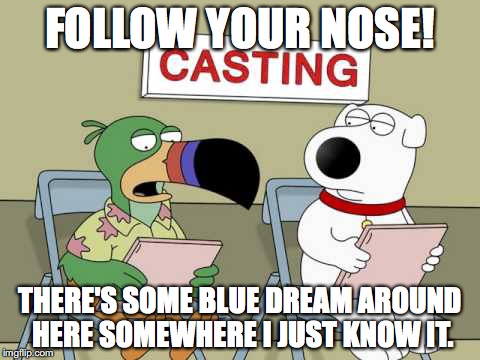
All Roads Lead to Rome
When people follow the footsteps of others, the trodden paths give way to trails, eventually paved for vehicles. This begins to tightly constrain the set of paths taken from city to city. When all roads lead to Rome, so to speak, how hard is it to infer your destination and your origination? Your coming and your going?
Robert Frost - The Road Not Taken
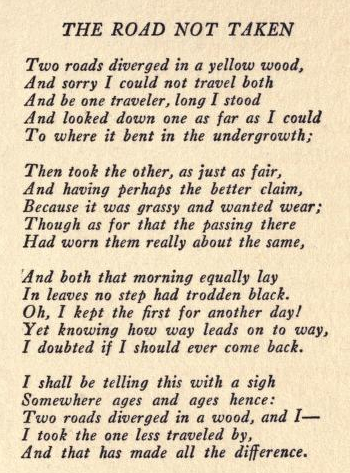
Who Is Tathagata, Trebek?
What do you desire to manifest? Do you desire the typical or the extraordinary? Why? Would you allow yourself to become a conduit through which others can project their will? Why or why not? Would you do so without knowing exactly what you are allowing your sociophysical flux to manifest? Most people would not, which requires evil to leave them ignorant of true causes and true effects. What desires, will and objectives would you allow to be manifested through your hands as a conduit? Does it even matter to you? Of course it does, if you are someone who values your life and the lives of others. No matter whether great or small, or artist, architect or pauper, our works here on Earth speak volumes about who we are. Still, if we are not aware of what it is we allow our consciousness to create, we will find our energy used up and our lives dried out.
Moreover, if we are prohibited from understanding what it is that our energy is being used to build, we will surely find ourselves roped into someone else’s scheme. What is good about what we and others do? People love talking about their acts of charity, humility and compassion. It is less clear what is evil about people do because evil is always cloaked in deception. It is also possible for good to be strengthened by works built in darkness, since it’s difficult for evil to dissect them and defuse them.
Yes, This Is The Way: 道 =~ Road =~ Dharma
This is a 3D Graff of the Kanji for the Dharma12. It is literally The Way. See the footnotes for more information on the approach I would take to my own art if I were ever permitted to achieve anything in America.

The Problem of Higher-Order Moral Systems
What is good and what is evil anyways? Can there ever be one without the other? If dualism prevails – which it does, in a way – this results in an incredibly complicated understanding for what is “good” and what is “evil.” This is especially true in a world where both the understanding of good and the willingness to fight for it depend on having experienced evil or seen it corrupt those around you. If we haven’t seen the works of evil, then what drives people to work so hard against it? How can people be easily rallied to defeat it when needed? How can people know when evil has taken root, if they can’t recognize it for what it is?
If the above, more dynamic understanding of good and evil requires patience, wisdom and knowledge to even distinguish the higher-order good and evil from the lower-order good and evil, then, to prevail, evil requires ignorance, attachment and suffering. It is irradiated by light and the worst kind of evil will seek to squelch out light and all desire to seek light before it spreads virulently. Regardless of the lives they’ve lived or which wines they’ve tasted, people tend to take action against evil when they see it. In spite of the sacrifices, some of use will take up arms against evil and will gladly throw our lives into the fire to save those we care about. However, we can only choose to do so if there’s enough light to choose to act when it matters.
Sociophysical Forces Pull Us Like Magnetism
“Love pulls us on to that distant horizon”
All Causes and Effects Are Intertwined And Convoluted
There are no independent causes and there are no independent effects, everything is intertwined and convoluted. We are all at the mercy of actions already in motion that we cannot hope to withstand. Instead, all we can hope to do, individually, is amplify the good intentions within us and dampen evil intentions. At the social scale, if we dampen the tendancy to become attached and dampen attached intention, we ultimately dampen the effects of evil and selfish desires: for control, for possession, for wealth. According to the Buddhist doctrine of Pratītyasamutpāda – dependent origination – the only phenomena to exist outside this hopelessly intertwined, literal convolution of sociophysical cause and effect is the set of information which is totally independent, if I understand this correctly.
Can Causality Exist Independent of Time or Space?
Traced backwards, all beings arose as the result of convolution of physical interactions in chaotic dynamical systems. There is no mathematical system with chaos, that does not result in increasingly complicated order, life and awareness, given sufficiently protracted running time. This is because every system of chaos begins to result in compartmentalization of being into forms, which entities within the system must recognize along a stratification of types. If you hope to make predictions in the chaotic system, your system must take into account this perfraction of types of state spatially distributed in the system. This results in an illusion of separation, awareness containerized into entities distributed across the space in the chaotic system and, eventually, self-awareness.
Do Not Give Rise To That Which You Abhor
Regardless of how proficiently toxic your manipulative adversaries and whether they’re formally organized, when you cleanse yourself of negative intention and liberate yourself from preconceived objectives, then, to evil, you have literally cloaked yourself in invisbility.
Everything that exists in materialistic metaphysical world originates in the hearts and minds of men: both good and evil. If you cannot allow yourself to intend negative consequences from your actions, you cannot so easily lend yourself towards evil’s intentions. That is, you exercise discernment to prohibit yourself from directing your energy towards that which you find to be morally reprehensible: you’d never socially finance that thing, give it a cent or pay it any mind. If you have no vices, there are many fewer typical patterns that evil can weave into your life to gradually pin you down. If you live virtuously, towards humble aims and the steady accumulation of sociophysical potential energies, then when you are attacked, you have plenty of capacity to respond on your own.
The Dalai Lama Discusses Discernment In His Book, Beyond Religion: Ethics for a Whole World

In this book, the Dalai Lama recommends empathetic joy, which Americans find horrifying, offensive and potentially symptomatic of mental illness, if they don’t know you personally. “He smiled at me for being happy. He’s crazy! Doesn’t he know he’s in the psychological torture program?” No… I had no idea, but apparently, protracted psychological torture is all I’ve ever known as an adult in America. Apparently, everyone else in America knew about this little program.
“Be Water, My Friend”
When you suppress your sense of ego, you become fluid: your sociophysical potential energies can easily be kinetically diverted towards aiding your life or the life of another, if evil reaches out to destroy or use. To become fluid, you must disconnect from your own preconceived conceptions about your life. This does not mean that you do not develop plans, goals or objectives, but instead you remain flexible and balanced. You must develop acute awareness of situations, so that you can utilize serendipity as it is presented to you. Ultimately, you should develop in a generalized manner this ability to harness serendipity. Preferably, you can inculcate this tendancy to use what is presented to you so that it becomes unconscious. Life is always handing you what you need, though it’s not always easy to see.
There may be dozens of people attached to you to swat the serendipity right out of your hands, which is unfortunate.13 This is almost certainly not true.
What appears serendipitous and miraculous to you, might not be readily apparent to others. Knowing that we are all one, then also, what might not be readily apparent to others might be serendipitously miraculous to them, while requiring some instantaneous action of your own. This virtuous, selfless action may require personal sacrifice, but if we are all one, you would gladly pay it. Mara cannot know this: selflessness is literally incomprehensible to evil.
The Path of Least Resistence Leads to Crooked Rivers and Crooked Men
Such a path is useful, for both good and evil, but is identified nugatorially. Find people following this path: now you know where they’re going and where they’re coming from. This is a little-known secret to resolving uncertainty in human-behavior. Are people following a path of least resistence? If so, their destinations become trivial to infer, regardless of the charades calculated by the media concocted to distract people from understanding the true intent. Further, money is sociofinancial energy, find the path of least resistence for money and everything else falls into place around that. Follow the money. It’s quite simple. When people place their chips on the table, they usually mean business. If there’s no money down, who cares?
Calculuating the path of least resistance can be efficient or it can be intractible. Path-finding algorithms are well-studied in computer science and for video game design.
A GPU-Based Path-Finding Algorithm To Find Shortest Paths Through A Floorplan
This problem is significantly less complex if the floorplan can be guaranteed to not contain loops. When a floorplan contains cycles, algorithms with matroids are required to simplify using Spanning Trees.
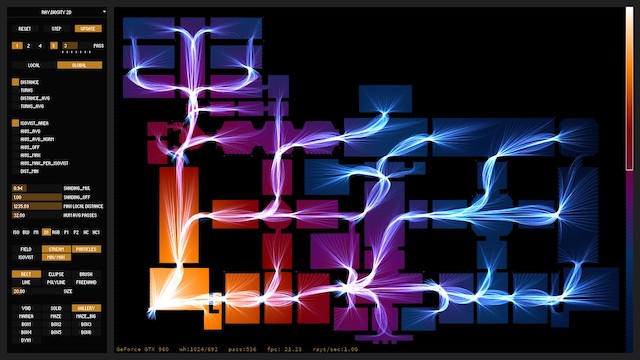
Furthermore, floorplans that do not have loops allow people within the building to make much more accurate assumptions about the intention of other people that aren’t even visible based entirely on the presence/absence of cycles. This is because the discrete graph of the floorplan forms a tree and is combinatorially less complex. Therefore, if someone is walking along a particular path, the set of potential destinations they are walking towards is also exponentially less. Extrapolations about someone’s path through a building are similarly augmented when there are fewer doors, rooms and entrances. These are critical design concerns for level design in video games, architecture and many other fields. If you do not constrain the design of your levels with these concerns, AI algorithms may not run proficiently because AI must compensate for the loops.
Evil depends on our own attachment to our personal designs on life. By decoupling from the specifics of those goals, we’re convoluting the complexity of sociophysical computation by depriving Mara of any fix-points in reality upon which she can make assumptions. There are many things people can do, rendering their behaviors unexpected and incredibly disruptive. Evil will always seek to condition you through belief and propaganda to avoid doing these things that make you less predictable. Doing this can be good, depending on for whom your intent appears more predictable.
GPU-based Flowfield Even Allows You To Solve A Maze!
The following video demonstrates abuse of color-channels for compute shaders, but no textures were harmed in the making of this video. Sometimes you wish you had 32 color-channels, but unfortunately, GPU’s require the implementation of techniques in hardware and there’s a hard-limit on 4 color channels, perhaps eight. I want to cry sometimes. This is one of those times.
FlowField Pathfinding from Thomas Diewald on Vimeo.
Rendering Society Incomprehensible to Evil
Mara only comprehends men who seek the path of least resistence, not fluid men who do not conform to any worldly desires or mechanisms of control. When you render this path of least resistence difficult to know, you’ve made evil’s job a little bit harder. Such a path is predictable and often quite irresistable. Identifying the paths to people’s [unstated] goals is the best way to catch sociopathic people in the act. For sociopaths: identifying this path is what you can depend on! You can literally depend on the callous sociopath’s tendency to maximize personal gains if you present them with a situation they can’t resist where they can’t see through the trick.
Because selflessness is incomprehensible to evil, if we are all a little more selfless and fluid, then society as a whole becomes less susceptible to evil. This starts from the grass roots at the level of individuals, who must autonomously act today to preserve tomorrow a myriad of possibilities, unencumbered by the informational burden of actions. Some action is necessary to accumulate various types of sociophyscial potential energies, but uninformed action will instead cause us to accrue a massive informational burden associated to our identities.
However, if people are fluid, but have not accumulated social, financial or informational resources of their own, they cannot do much when the time comes to act. There is a social analogy to the financial savings rate in a country, but this sociophysical savings rate is more about having developed a robust safety net and ensuring that each node is empowered with sociophysical potential energy. When this safety net is in place and sufficiently well-developed, then individuals can choose to respond and ideally, there are no social nodes which are vulnerable purely from isolation. America could be leveraging data science to this end, but the government has instead chosen to leverage data science and surveillance purely as a mechanism of control, a tool to destroy lives where a handful of people decide it’s necessary.
When people are empowered as individuals, we are most capable of reorienting towards our social circumstances as we see fit. When people are instead told to fear anything with power except that which stems from the government, people become systemically crippled when responding to tyrrany. Americans are being told to fear knowledge and to fear dissenting information. We’re being conditioned to need the government, not to be free from it. Poverty conditions us to seek the option that sounds like it’s going to amerliorate or pain soonest or most effectively, but if you seek an abusive master in response to pain and poverty, you may find yourself abused for life. Worse, you may find your friends and family abused for generations. You have to liberate yourself by your own hands, so that no one holds sway over you, your liberty or your ability to help each other. While I will not judge anyone who seeks government assistance for help with poverty, I will not take a cent from an abusive government which has ruined my life. I never have and I never will and I couldn’t be happier about living with nothing to my name, if it means that I don’t have to be subservient to an abusive force.
Impoverished People are Tragically Predictable
When people are generally empowered, they are fluid and their reactions are difficult to predict. When people are subject to poverty, this systematically limits their options: in geographic terms, people in poverty become unable to move; in temporal terms, people in poverty have less time to respond to threats. In logical terms, people in poverty have a decision-space that is mathematically limited because most options are financially restricted from them. Because impoverished people are more predictible individually, they are more predictable systemically. Impoverished people are desperate: they will believe anything you tell them that seems to amerliorate their pain and they will predictably take the first appealing option given to them. This leads impoverished people to tragically have the wool pulled over their eyes, while they get roped into some scheme. Since they don’t have access to educational opportunities, they often end up enslaved by the consequences of their ignorance. Worst of all, the typological extent of the variety of their life experiece is vastly limited when compared to people who are not impoverished.
For the typical impoverished person, most of the folly and pain they experience is the result of being predictable and their being used for someone else’s gain. They’re not stupid: their options are financially limited and therefore, they suffer because they are predictable. Why is it heresy in America to wish that people are empowered? To encourage others to question authority and to help each other live by the merit of their inner strength? To cultivate this sociophysical potential energy, we must all live so that we steadily gain value from everything we do, whether that is social, financial or informational value.
To do this best, we need all people to be strong – but instead, Americans are encouraged to surrender themselves to a vindictive authority out of fear that strength is dangerous. We are encouraged to deliver our neighbors, friends and family into torment and told that, if we comply, we will be secure. NO! If you comply with this, you deserve neither liberty, nor security. True strength comes from within and it is steadily accumulated by piety, love of virtue and love of one another. We must never forget that our strength derives from our freedom. Therefore, we should desire to liberate other people around us: financially and socially. People should be encouraged to be independent and capable of living independently.

The greater the number of people who abandon attachment by shedding some self-ordained objectified understanding of reality, the greater the composition of the social fluid that is agile and unpredictable. When we all become fluid, with a convergent set of postitive intentions, then collectively, Mara is blind to us. Mara is unable to predict people and thus unable to use people. That said, being predictable to some is good, but being predictable to evil means that evil can determine your actions by manipulating you. Do not allow evil to believe that manipulating you is even possible and evil will pass you by to find another tool.
The Eight Jhanas from the Ariyapariyesana Sutta
Another Translation of That Line From Mijjhima Nikiya
This bhikkhu is said to have blindfolded Māra, to have become invisible to the Evil One by depriving Māra’s eye of its opportunity.
This section of Majjhima Nikaya section describes progression of medititave mindstate through eight Dhyāna or jhana. However, these passages of literature appears to establish a pattern of thoughts intended to be used as objects of meditation in successive stages, with the ultimate goal to utilize meditation’s trasformative effects to create a mind that is capable of liberation in the conscious world, espcially from the fate of being a pawn of desire or of the powerful.
Progression beyond the fourth Jhana is exceedingly rare, in both transcending this in the state of meditation and in embodying these understandings in the conscious realm. Meditation merely facilitates the inculcation of these understandings. Speaking from my own experience, I believe that meditation allows the brain’s constraints over the mind to relax so that the mind begins flowing in such a way that allows us to viscerally experience the metaphysical realm. I wrote about this in Meditation, Conceputual Designation and Monadic Metaphysics. I believe that these Jhanas describe a progression towards the mind’s experience of raw metaphysics, which is why it talks about an increasing progression towards mindstates indicating spaceless consciousness and consciousness without the capability of perception.
Please keep in mind that I am no authority on Buddhist thought.
I’ve barely studied myself and only hope that I can encourage you to study for yourself without tainting your perception of Buddhist thought with what I have written, spoken or thought myself. It’s not easy to make these insights, but the best advice I can give you for meditation is to be open-minded, patient, to realize that you are already capable and to understand that you have to try to not try. It is a feeling of surrender to the natural state of the mind; these are not cognitive patterns that can be forced in any way. If you want to make it anywhere with Buddhism, spiritualism, or religious practices, you must commit yourself to it. It’s really not something you can pick up and put down when it is convenient for you, which is unfortunately what I’ve done all too often.
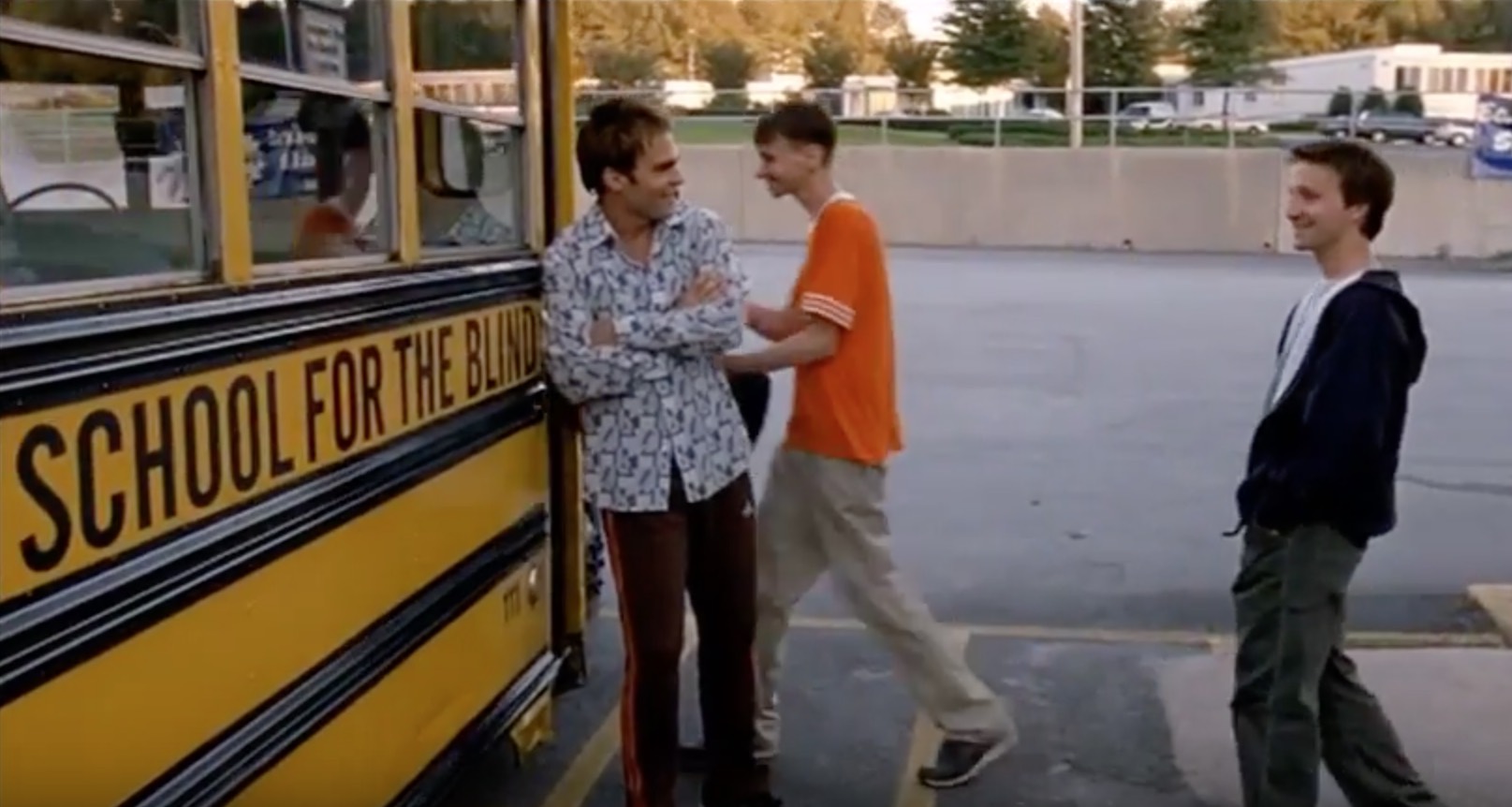
On the Symbolic Parity of Literary Translations
It’s critical to read multiple translations of philosophical and religious texts. Each one leaves varying degrees of satisfaction in the parity of symbols to connotation. To be clear, I’m no authority on this subject. In my brief exploration of classical literature, I’ve found very dissatisfying translations in works of philosophy, plays and classics. I never know enough about the text I’m reading to have valid preferences, but some of them yield pitiful extrapolations compared to others. The New King James Version (NKJV) in particular is one that stands out as … not good. After reading several passages, I felt that the text had almost been edited, not retranslated. It feels symbolically abbreviated, compared to KJV, ECV and NIV.
As for the states of mind specified by the jhanas, are those who progress through and embody these states of mind necessarily pure? If so long as they embody those mindstates and social states? Does this progression of mindstates move towards an ideal that is the opposite of the being Mara epitomizes? Or, instead, are these mindstates instead purely devoid of the elements required for suffering and evil? If it is the latter, then does the progression through these eight mindstates render one’s mind into a body like that of water? Pure water is receptive to become any form and can also absorb impurities? Similar to the destination of nirvana, can such liberation of consciousness and social circumstance be extended ad infinitum? Or is it possible for what goes up to come down again? Perhaps, is it tragically useful for those proxies of Mara to rip the wings off of anyone who had ascended? Is it possible to fly without getting too close to the sun?
If You’re Out There Generally Liberating People, Watch Your Ass
When people are freed of negative intention and equipped with the knowledge of causality, the size of the splash they’ll create pars alongside the magnitude of their desire to liberate others. When this is combined with a propensity to cultivate in others the same desire – Bodhicitta: the desire for all sentient beings to be liberated from suffering – this person may sow the seeds for a tidal wave in true societal change. All it takes is knowledge, wisdom, sociophysical potential energy and strong desire to liberate others, which is a bit of a paradox in Buddhist tradition and one for which I should not pretend to be an authority. In order to cause effects that do not ultimately harm others, you need to be capable of being surgical with your influence. This is why knowledge of causality is so critical.
However, if you are personally effective in liberating yourself or others, then you can be sure that Mara will be there to chain you down again, with her three daughters and the three poisons: attraction, aversion and delusion. Mara will delude you with techniques like gaslighting. She will lure you in with worldly pleasures, so she can pin you down, leveraging your propensity to be controlled by desire or to remain commited to previous obligations for receipt of that which you unwisely desired. Further, if you are successful in making a major difference sociologically, you can be certain that Mara will track down the source of liberation. To Mara, people are not to be free, they are to be used and chained together for profit and power.
Here, I use Mara here as a metaphor, mostly from my [limited] understanding of Mara as the deity who tempted the Buddha, while simultaneously conspiring to destroy him to preempt the self-propagating change to follow his life.
Is There Truly Such A Thing As Chaotic Evil?
If there is, doesn’t that problem mostly solve itself? Isn’t chaotic evil simply insanity? What does evil serve if it doesn’t serve the self? And insomuch, mustn’t all manipulative and evil people be driven by their desires and attachments? Narcissism, sociopathy and psychopathy seem to be means to the end of feeding the self by likewise leveraging others’ tendancy towards their own attachments. Therefore, insomuch, how does one most effectively use others? By encouraging their tendancy towards attachments. One can exacerbate such tendancies in people, specifically and in the population generally. It’s easiest to lead astray those you don’t know, those whose falls you’ll never see and those whose detriment doesn’t affect you or those close to you.
Generally, the more people who are bound to the expedient and pragmatic attainment of their desires, the more people that are available for evil to use. When people instead generally choose not to want, to disdain desire and to shed attachments, then motivating them towards something they want or do not want requires more intent, more energy and more severe means.
Evil compels people to magnify their sociophysical energy by lensing lust for attachment through branches of the social graph. By projecting informational signals, you direct the cumulative attention of people in society. Similarly, you can direct the cumulative desire through networks of people bound by attachments and incentivized by desire. The nature of power causes people to always begin arranging themselves hierarchically. Unfortunately, power and its accompanying sociohierarchical structures seem to be necessary to providing the most good to the most people; for now, there is simply no other way to effectively lead or govern. As population grows and, particularly population density, the social graph begins to stratify itself, insulating more powerful nodes as the less powerful are externalized to lower strata. Forgoing the social impacts of telecommunication, greater population density accompanies increasing emergence of stratification and specialization in the social graph. The least connected regions of this social graph are where both the most and least powerful nodes reside, but power always corresponds to a greater range of 1° and 2° span of the social network. i.e. powerful people may have less 1° connections, but always have a greater social reach. As one zooms out on the social graph, a gradient of power flow should clearly become visible, if a measure of social power can be measured.
Magnanimity: Why Must Power Inevitably Corrupt?
The best leaders exemplify magnanimity, the “crowning virtue” featured in a discussion on Artistotelian Ethics in the Facets of Greatness. Operating magnimously requires exemplifying the other Aristotelian virtues. A magnanimous leader develops redundancy into the avenues whereby they exercise their power. They leverage one circuit of sociophysical energy against another – compelling their subjects to compete against one another in serving higher values, while disdaining what is lower. They incentivize behavior by appealing to their subject’s sense of honor or values systems. By appearing to uphold these values justly and equitably, you incentivize people in a way that renders you practically unassailable.
Magnanimous leaders are still vulnerable to deception and karmic obfuscation. Mitigating co-opted subtlety, indirect threats and the cultivation of potential threat vectors requires cultivating constant awareness of affairs in their realm and thereby raising redundant options for statecraft. However, in order to make gains against other magnanimous contemporaries, they must also leverage deception and karmic obfuscation to act, while making minimal concessions in appearances. Exemplifying magnanimity is much easier when your position in society places you above others, yet maintaining this position still requires unparalleled foresight and intuition. These people and everyone who serves them must always walk on eggshells, but is it worth all the extra care? Everything they want to do must be deconstructed, encapsulated within handling protocols, and delegated amoung networks of people. Just as devops processes for web applications develop problems specific to large-scale deployments – e.g. deployments of containerized applications to stream-processing requests for sharded services – scaling logistic processes to large networks of people for powerful leaders or large organizations requires solving many similar problems.
Dali - The Tallenge Store
Each one’s got their own angle…

The seemingly vain adherence to etiquette and those values systems distributed by vague doctrine: is it worth the trouble? That doctrine is often religious or esoteric in nature; rendering it simple for followers to question and external influencers to undermine faith. Who’s interests to those systems serve? Why are people willing to sacrifice themselves to die in the service of magnanimous leaders? Because, regardless of whether simple-minded or common people understand the complicated mechanics and dynamics of power, what they do understand is when serving their leaders serves their own interests. When leaders act magnanimously, they do not stand for themselves, their own attachments or their own realizations of desire – instead they always stand for something higher. The average person realizes this intuitively and when they see that serving their leaders means serving truth, justice and reason, they are willing take on risks, to work harder and to absorb causal fallout of the mistakes of [some of] their leaders.
Magnanimous leaders are patient and place themselves in the service of higher ideals until they find their own circumstance in life raised up by accumulating merit. Less ideal leaders tend to motivate and incentivize people in more negative ways. To the end of attaining their desires and servicing the upkeep of their attachments, this seems expedient. As for these short-sighted leaders – regardless of their undestanding of the circumstance of those they use or whether their pawns are destroyed once used – they seem to be able to gain power quickly, but they often lose it even faster. By allowing their hands to become dirty, they make the quick gains they see. This renders the inexperienced short work for the wise, which only becomes clear later in life. After tasting what seems like success, these myopic leaders and manipulators are rightly ruined by karma. They become burdened by their past mistakes, their unwise desires and the need to service the own attachments they’ve accumulated along their life’s path. Unless these people flee their obligations, they become restricted by the past.
It’s slow, steady and humble that wins the race. You must serve ideas, not people and not attachments. Unfortunately, it is difficult to attain the knowledge and wisdom to know which ideas to serve. Systems like religion, philosophy or academia are shortcuts for finding a noble path. What do you empower? Those who you choose to serve and to whom you choose to contribute your sociophysical energy: what do they empower? We should detach from our present circumstances and act fluidly as conduits for beneficent ideas.
Maintaining Magnanimity and Social Posture Requires Indirection
How can we know to act without seeming to have acted at all? Why is it important? Understanding the nature of causality and the consequences of karma is so critical in understanding this. Knowing that you’ve identified minimal course of action is crucial to preserving your sociophysical potential energies.
Perhaps there is some situation of concern, wherein you recognize someone needs help. Those who wander throughout life, are presented with these situations constantly. How to act in a situation of concern without changing anything? If you chose to act, why? Who or what presented you with the information that informed you of a need to act? How to act so that your actions minimally affect the course of that situation? Why is that so important? For someone trapped in such a situation, if they have minimal social and financial resources, what range of options do they have? They have very little power and, especially if they are socially disconnected, the informational ripples stemming from the situation have a tendancy to be very distorted. Such a situation must be approached carefully because every cause has it’s own causes. There are reasons for everything.
Dali - Le Main
If you have social and financial power, you must exert care over your actions and limit the situations wherein you become entangled. If you have resources, you have something to lose and something to take. Once you become entangled, it is difficult to extricate yourself without appearing cold. Worse, for the rich and famous, anything they touch becomes warped and turbulently affected. This often leaves them isolated through life and, subsequently, easy to control, even though it appears they have everything they could ever wish for.

If you want to intervene in some such situation, you must examine what you know carefully, until you can construct a monadic russian doll that contains within it this person’s implicit means of salvation or judgement – though perhaps identifying ways to judge people is not so critical. This allows you to pass something like a handler function into the situation. Then, once it is unwrapped and it’s consequences unfold, the person is placed into a situation where their response measures their character. To do so most effectively, you cannot interfere with the situation directly, but only act indirectly to ascertain information. This informs your construction of monadic components that the person who needs help will reach for only if their character causes them to make the correct decisions.
In doing so, you prompt the person to identify tools or options they can use in the situation of concern, but the tool only functions if they make they right decisions and prioritize the correct values. When the person reaches for the tools you’ve given them, it can also prompt true changes that emerge within, from a cognitive-behavioral perspective14. Thereby, this person believes the capacity was within themselves the whole time and also believes they must own the consequences. Furthermore, you avoid potential causal entanglements, while gaining more insight into that person’s character. Crucially, you have not simply fixed the person’s problem, but “taught a man to fish” so to speak.
If you do this right, then once you’ve acted, it appears you’ve done nothing at all. If the person has misrepresented the situation to you, the tool/option you’ve provided doesn’t quite function – and exactly how so tells you more about the situation. If the other people have misrepresented the situation to you, then your attempts to minimally interfere should have elements monadically encapsulated within that provide you with more information without having appeared to involve you at all. The more social resources you have, the more effectively you can appear to have acted sociophysically destablizing the sitaution. When other people seek to misrepresent that situation to you, then your indirect attempts to aid that person will provide you with information about who is deceiving and who is acting on bad information. Since they don’t know you’re interfering, they may not know to lie to you or your proxies. In the reactions of the subjects of your aid as well as those around them, you’ll begin to infer why sociophysical energy and intent are invested in that situation, without having changed the nature of the situation and without alerting those invested in the outcome to your involvement.
Towards methodologically understanding whether or not your actions will create turbulence, there are sociophysical metric of degrees of indirection, similar to degrees of separation in the social graph. These are moreso informational degrees of separation and present informational transactions similarly to that of financial transations. You have to know how to act to change just the things you want, while holding everything else stable
This Is Not So Different Than Curling’s Notion of “Burned Rocks”

No, that’s not the burned rock. The Canadians did not burn that rock. They did, however, decide to send that rock to the Phantom Zone.
Without the wisdom and knowledge of action without change, you cannot act to obtain precise changes without risking or creating sociophysical turbulence. In addition to destabalizing plans to serve your own ends or that of others, you’ll end up destabalizing the goals and actions of others – I’ll be the first to tell you it doesn’t please anyone. For your actions to create a response with surgical precision, you have to know. If you are forbidden from acquiring information about your circumstances, you cannot act without creating negative reactions.[^in-my-defense]
If you want to know who’s causally responsible, ask your self these questions. Who had social, financial, and informational resources to change things? Who had influence and power? what did these groups of people intend to create? What information did they propagate and why? What information did they seek to prevent being unveiled to various groups of people? In my situation, all you have to do is understand is that I had as close to zero social, financial and informational resources as possible. This is generally true throughout my entire life and whenever I begin to accumulate social/financial resources, it is immediately smacked out of my hands.
Avalokiteśvara Has A Thousand Hands, But Why?
Don’t let me conclusively answer this question for you…
Like so many other mysteries, it’s better if you find the answers yourself. This, coming from me, is a flavor of irony with a distinctly pungent flavor.

It is nigh herculean to live in these ways and wouldn’t it be nice if you had a few extra hands from time to time? It requires eloquent investment of personal time and energy to be compassionate. There are myriad ways attempt to be compassionate when interacting in social situations. Some means surgically yield profound and lasting changes while other means generate far too much sociophysical turbulence as a result. For this and many other reasons, it is a computationally hard problem to determine how to act compassionately to achieve the effects you want to see in the world, while minimizing side effects. Far less recalcitrant it is to identify some abstract path of least resistence so that you can contort situations to your advantage.
A million ways to do right and die trying;
And a billion ways to do harm, but who’s counting?
There are myriad ways to act while creating a compassionate result, when seen from the eyes of the person you’re trying to help. There are myriad ways to act while creating discompassionate or incompassionte results. Whether you intend to create positive, neutral or negative results, the challenge is acting to create the result you intend without generating destabalizing discord, as a side-effect. If you are altogether dispassionately detached from the consequences of your actions or perhaps unwillingly ignorant, then I hope your causal waves do not crest into a tsunami of karmic discord. This is, after all is said and done, what a scapegoat is for: that wave comes crashing down with their name on it. If given the chance, would they have tried to stop it?
Informing your actions to create minimal side-effects is what contributes most to the intractibility. You must apply techniques from functional analaysis to sociophysical problems to extrapolate the qualitative consequences of your actions. If all people – or simply enough people with influence – share a belief system such that they react to sociophysical turbulence or the unrestrained effects of causal waves, then we socially absorb the turbulence more efficiently and effectively. Furthermore, when such a belief system is prevelant in enough nodes with social influence, then calculating the sociophysical consequnces of someone’s actions itself becomes an easier problem because of the assumptions people can make.
Ultimately, anyone who intends to create specific results is exerting a voluminous time and energy into the thought behind their actions, from the very start. This is yet another reason that the intent people harbor in their hearts is so critical: if we do not harbor darkness in our hearts, how can it give rise to negative thoughts, actions and words? Even if someone is capable of covering all the negativity they create to successfully hide the truth of the causes from everyone else, if they did not intend to create such negativity, then at most, we would be living with the consequences of accidents and phenomena beyond our control. Instead, if the intent in our hearts was beneficient and our fidelity to altruism remained unblemished, humanity would have far less disruption and negativity to deal with. We would only be dealing with the karmic fallout that extends from the biological and economic requirements of human existence.
It is no doubt incredibly frustrating for people to heavily invest in someone or something, all for it to be ruined no matter what they do.
Dali - Ascension
Compare this western painting with Ryūnosuke Akutagawa’s short story The Spider’s Thread.

onDavidConnerSuccess(additionalGenericMonad(this.sucks).destroyDavidConnersLife);
I feel that innumerable people have tried to help me, but that it doesn’t matter what they do because there’s a small fragment of people whose objective is to destroy my life, regardless of how much effort other people invest in it. At this point, it is like their raison d’etre: any success on my part would destroy them, especially if it’s public and causes people to question “the official story” – whatever that is. These people, whether acting intentionally or not, see any sign that i’m either moving towards specific goals or accumulating social & financial resources as a sign they need to act to disrupt my life, in event-driven fashion.
At some point, you really have to wonder: what makes this person so critical to destroy? Why? I am a rational person – I actually do try very hard to be rational – but holy shit, I have been living this firsthand for the past decade and it is undeniable.
Ordinarily, people would have given up trying to help me a long time ago. Why? It’s expensive to help someone. Financial resources are limited and so is sociophysical potential energy. You can’t help everyone, so when people focus their energy towards compassionate, they generally want to see a positive result.
However, my own life seems to demonstrate that, no matter what you do – regardless of how much time, energy and money you expend – small groups of people can act simply to upend anything that is done, if they so choose. This seems to be most efficiently done by socially disconnecting that person, creating sociophysical turbulence and essentially surrounding that person with the polar opposite of the Steve Jobs reality distortion field. It’s tragic: such a small group of people can trivially inject sociophysical turbulence in my life to stall any and all progress.
There might only be several dozen toxic people who consciously intend to perpetually keep you in a dungeon of psychological torture. Even so, if they wanted, they could literal outweigh the efforts of the rest of the human population, simply by injecting sociophysical turbulence to disrupt anyone who tries to help you. If they pick on someone with a developmental disorder, who is gullible, oblivious to social norms, easy to deceive/disrupt, then if they prevent that person from every attaining any social/financial resources whatsoever, then “they” can keep you in that dungeon until you decide to hang yourself like a GITMO inmate. Incidentally, suicide is one of the intended final destinations of that program.
To Turn The Other Cheek
The destablizing effects of sociophysical turblence will continue to reverberate across the social fabric until enough individuals choose to transmute it and exert their energy in quelling it. This is very similar to the problem of turbulence in aerodynamics and physics: any time you have turbulence, your system rapidly loses energy. If you’re designing a car or aircraft, then features of its design that creates turbulence near the vehicle cause it to be more susceptible to drag. Thereby, the vehicle surrenders its efficiency to high-entropy motion of particles.
Fortunately, social physics lacks the exact equilibrium dynamics of purely physical systems with equivalent exchange. Therefore, one can alter the “shape” and trends of sociophysical interactions using information. This is what it means by choosing to construct your own reality. You can choose to direct your attention and your beliefs towards whatever you choose. Some of those beliefs might concern information more convergently shared in reality: among these are things called FACTS, which are often pretty hard to argue with. You’d be suprised though.
Your “Crazy” And What-have-yous? Nothing.
When groups with sufficient influence get to decide which “facts” can be vehemently assaulted by targeting anyone who propagates them with directed negative sociophysical energy, this can perpetuate situations which are very difficult to resolve. i.e. things that are “not” classified information and for which it is practically illegal to consider as anything but non-sense. For me, any details about my life that are not maliciously intended or incredibly negative are essentially classified information because I’ve been memory-holed, which is like the toxic version of the “Steve Jobs reality distortion field.” So, is it any wonder that I’m a walking sociophysical black-hole, a karmic vortex which you cannot look at whatsoever without being targeted? Thanks, America. Oh, and I get blamed for everything, but never tell me that I’m a walking dead-star… that’d practically be illegal. Fascinating! Yet, tragic: it can apparently rip families into pieces, WITH ZERO LEGAL CONSEQUENCES.
Because of the lack of true equilibrium dynamics, then by altering the shapes of interacting sociophysical phenomena, we can quell sociophysical turbulence without precisely equilvalent investment of energy. However, sociophysical systems do still have phenomena that parallel equilibrium dynamics, so events with large magnitudes of sociophysical turbulence do still require proportionally large investments of energy to quash.
By generally turning the other cheek, even when you are harmed by something, you absorb the negative karma in a way: and you don’t unwittingly propagate the consequences of others’ actions. Instead, your actions allow you to, internalize, transmute and purify the effects, instead of acting as a vector for propagating it. Doing so doesn’t necessarily require a net-expenditure of sociophysical energy: you can respond to disruptive, unwelcome or rude events in this way by ultimately gaining from them.

“With Mercy, There Is No Deed Without Virtue”
Here Is A Separate English Translation:
When together with compassion and mercy, there is no non-virtue.
The quote above is a line from the book Chandragoman’s Twenty Verses On The Bodhisattva’s Vow, a book that caught my eye at a Boulder bookstore, in the middle of Startup Week 2013, two weeks before that time I allegedly suppressed my memories … for love. During a recent reading of these twenty verses, I spent about an hour in thought after reading this line literally.
How can it be that there are no actions without virtue? There are certainly non-virtuous actions, per se. However, we are all given choice over how we respond to non-virtuous deeds. To me, its meaning is similar to turn the other cheek: it’s about absorbing and transmuting the sociophysical reverberations of actions with negative karma. If you choose to internalize that wrong instead of responding to it in kind, then one can transmute the experience of having been wronged into one that is virtuous.
Its importance to the Bodhisattva’s vows can be understood by zooming out to the sociological scale: it’s critical to consider it to be virtuous to absorb and trasmute the consequences of actions with negative karma. What happens if you don’t? You can choose to suffer with the consequences of that non-virtuous deed. You can also choose to repay it in kind: either to directly the the person who inflicted it on you or perhaps by reflecting the consequences onto another person.
Why do people engage in non-virtuous behavior? It primarily stems from ignorance, but less indirectly, it’s usually to satisfy a need or desire. People sometimes try to take from another, by foisting the costs of their needs and desires upon someone else. People cause so many problems by wronging someone they consider weak: they often assume that person will turn around and do the same thing. perhaps, they by justify these learned wrong actions by assuming that’s just how the world works.
“Heroes Never Die, [REDACTED]” - Mercy
I donno what a “rez” is, but I’ll take two. With heals, please.

However, if people consider turning the other cheek to be a virtue, than even the common person can act as a kind of sociophysical “buffer” in the same way that buffer agents respond to changes in pH by absorbing acidity. When a significant amount of the population prefers to react in this way to wrongness, they can act to quell karmic turbulence. When instead, victims of theft turn around and reflect the consequences of stolen goods onto others by becoming thieves themselves, the consequences of the original sins then multiply. Those who turn to theft to account for the imbalance in their lives are choosing self over society by finding someone else upon which they can thrust their bad lot in life. When those who turn to fraud to correct an imbalance in their lives that originated from fraud, they are acting to reflect fraud throughout society. Such ploys are sustainable when small groups of people decide to work together at the cost of detriment to society as a whole. To do so, they justify their actions by claiming their group is somehow distinguished from the rest of society because they can’t see how we are all one.
Reflecting negativity upon others is never the solution. You are only temporarily pushing the negativity in your personal life upon the lives of others at the risk of normalizing the malice that victimized you in the first place. In order to stop this, people have to autonomously decide upon themselves to absorb negativity. To do this effectively, we must be equipped with knowledge, wemust be encouraged to network across the social graph in a way that does NOT exclude people. It is never OK to exclude people systematically: that is often what leads the excluded individuals to believe it is justified to act in a wrong way, which is incredibly easy if you’ve never been acknowledged by society or felt appreciated.
Utlimately, what do people want? what is it that individuals intend? and what is it that groups in society intend? Generally, when people accept “this is how things are” – and especially when this is used to justify wrongdoing – they have ceded all the power they have to change the world. True change requires suffering and if people do not choose to suffer for something better, we will always stay the course decided for use by those in power.
“You Will Not Silence Us” <=> Occupy Wall Street
As I’ve written before, take away publicity and you neuter any possibility of civil disobedience being effective. If no one witnesses the wrongdoing you endure, it may never change. Martin Luther King Jr.’s civil rights movement of Martin Luther King Jr. coincided with the explosion of visual mass-communication. No longer could society remain segregated under the expectation that too few people would witness the mistreatment that African Americans endured. Suddenly, you had news cameras everywhere in America, in segregated neighborhoods and even at protest events. Given visual, visceral exposure to this mistreatment, most white people started to undergo a change of heart – because it was now impossible to look away and to continue pretending that such incredibly divorced circumstances in segregated communities were not real. Today, systemic topic-oriented censorship means suffering is no longer witnessed by others; it is merely endured and perhaps for no reason. Suddenly, there is little reason to suffer collectively for change because there’s not much to be gained from it. Therefore, in the 21st century, when political dissidents are completely stripped of any publicity, you have robbed society of the avenue of civil disobedience.
What is happening in America seems calculated to undermine any potential for civil disobedience. Our leaders will not be aware of what those dissidents were trying to say, and America is merely damming up an impending sociophysical deluge: one that they refuse to acknoweldge. If and when this deluge is unleashed, it will be massive. This is because you cannot stem the tides of natural justice forever: you must divert the dissenting sociophysical energy with alternative avenues for flow, just like with a real dam. Otherwise, that dam will burst. Just because you’ve made it illegal to acknowledge reality doesn’t mean that which you do not allow anyone to see does not affect reality. You simply won’t be whatsoever aware of the nature of an impending threat before it hits you, which will be far too late. If the general population isn’t aware of a realistic threat, how can we prepare for it?
Why do our leaders expect that it’s intolerable for people who see real threats to speak about them or to be concerned about them? Because our leaders refuse to be accountable for their incompetence, our entire population is unable to respond to REALITY when that reality is uncomfortable. If you put your neck on the line in this country, you better have something good to say because you’re going to be tormented for speaking up. This is all very easy for me to say because I don’t have anything to lose; I’ve never been permitted to have anything in this country, which is what makes me so free. Irony comes in many flavors, but like coffee, this one’s an acquired taste.
Our Leaders Would Make Fantastic Ostriches: “What Economics? LOL”

Would You Like More Some Tea?
If I never taste progress in the direction of the gradient of success, how will ripping it from my hands serve to torment me? If I can never hold a driver’s license because revoking my license has simply been a mechanism to control me, why should I bother with a restricted license? If someone is not permitted to have nice things, how are they supposed to develop a respect for other people’s nice things? If someone’s not permitted to love or be loved, how could they possibly experience the love and compassion required to respect and care for other people? They simply won’t learn how to build relationships, but if your goal is to prevent them from having relationships, that’s perfect then, isn’t it?
Why wouldn’t I find retreat in a buddhist monestary? Because whatever follows me around the world will follow me wherever I go until I face it and destroy it. There is no hiding. There is no running. There is only standing up to this and pulling it out by the root. This dark miasma will follow me into any place I go, no matter how pure that place might be, to disrupt anyone’s lives, no matter how pure they are or who they are. This kind of darkness doesn’t care. You are a marked man. It may seek you, but it doesn’t need to find you, you will find it, over and over again.
The only way I know how to fight this is by waking people up, so that they see it for what it is, which forces this metaphysical autonomous form, this egregore, to expend its sociophysical energy beyond it’s maximum burn rate.
That’s the only way to stop this. you have to bait “it” into as many simultaneous battles as possible because it’s like a hydra crossed with a zombie epidemic. This compulsion for networks of people to dominate others is now empowered by technology. Wnless people stand for something and refuse to allow it to grow, it will continue consuming lives with coercion and racketeering until it consumes everything.
I didn’t realize this from the beginning, whenever that was. I have always tried to minimize the scope of this thing, but at no time in the past three years were my words ever heard for what they truly were.
Chrono Cross Intro: “What Was The Start of All This?”

In America, when a butterfly flaps it’s wings, kill it with fire… apparently. Until someone tells me otherwise, this is all I know because it’s all that my constricted life experience is capable of informing me.
This Has Been Yet Another Exciting Episode of Wu Xing Physics
This monk is said to have blinded Mara. Trackless, he has destroyed Mara’s vision and has become invisible to the Evil One.
This monk mentioned above isn’t quite tabula rasa, since a modicum of knowledge & wisdom required to understand is needed to live in this fluid & invisble way. If you aren’t quite precocious enough to attain these insights early on or have someone in life to guide you along so that you don’t make certain mistakes, then it’s all to easy for even the best of us to accumulate information we’ll carry with us for the rest of our lives. Religious belief systems and institutions are fantastic means for the kernel of such timeless wisdom to be handed down between multiple generations. It is the only way that such wisdom can be inculcated early on, so that it might drastically outweigh the effects of information created by the mistakes you’ll make without it.
I often wonder what can be done to wash off the sins of the past or the information of the past. Is it the information itself or the dispersion of iota throughout society that binds us down and defines us? If it’s the dispersion of iota – physically distributed datums of information – then what can be done when that is predominately misinformation and disinformation? What if the information that most tightly holds you down is lies that foment fear, causing you to be isolated without social connection for your entire life?
Tragically, the effect of such burdening information is the same, whether it is true or false. The effects of social isolation are much the same, regardless of the cause, regardless of whether they were imposed financially, socially or informationally. Poverty has many of the same effects of social isolation and leaves individuals in its wake with a paucity of life experience.
The magnitudes of these effects, whether postive/negative, are determined by the sociophysical distribution of information, the typological variance in specific responses that these iota provoke and the frequency of datum expression. Richard Dawkins explained many of these same effects through the study of memes as they parallel the expression of genes, but how is it that he cannot see the value of homogeny of beliefs and the social institutions which propagate them – viz. religion. Perhaps it’s because Richard Dawkins isn’t quite the athiest that the average person believes the label of atheist to indicate. It is perplexing that the many of the same people who pioneer and champion social physics are obsessed with dismantling “fictitious” religious institutions, while concocting their own quasi-mythologies like Scientology. How could they possibly not understand?
Scientology: Schödinger’s mythos. We’re all waiting… But apparently all my ideas are simply “woo woo physics”
The Apparent Ablation of Causality In A Socially-Superconnected Era
The questions and discussion above are critical, when viewed in the context of technology’s impact on informational dynamics and our perception of causality. If the best way to live in order to preserve fluidity and your potential for change later is to do so without the accumulation of informational baggage, then how is someone supposed to live and act in our new era in order to attain this state of fluid being?
There are many manipulative people who want fodder for blackmail and coercion as a general means of controlling anyone for the purpose of strengthen the chains of attachment which bind us to them. Today, superconnected networks facilitate the exchange of an unprecedented deluge of personal information – does that imply these controlling people now have more potential than ever to facilitate our bondage?
While I posted information privately on social media, I found that people used my post details against me, without my knowledge and without intending to give me a chance to fight back. Further, they used my social media to inform the tactics by which they interfered with my life. They hid all attempts to do so, but used my private information to facilitate their actions, which included running the rumor mill at full force, projecting information to people who could not actually view my social media profile to verify the information. It was ‘round this time, I decided to make everything I ever did online public, so that my private information could never be used against me. Since I have done so, I have had social media – as well as illicit and potentially illegal surveillance – used against me by God knows who to psychologically torment me and disrupt all attempts at friendship, love, and any of the other positive faces of social phenomena in the human experience. I have experienced only a few teardrops of love in the past decade, which is all that has ever kept me going.
I’ll be damned if I let anyone control me by snooping ALL of my digital communications. These wizards-behind-the-curtain are apparently so terrified of what I’ve posted online that they could never say jack shit to my face. In fact, if this is the last chance anyone ever has to make a statement about life, society and technology, then I’m going to stand up and scream and I do not care about the worldly consequences they threaten me with.
How the hell can these people expect to regulate love like that and get away with it? Go to hell, Machiavelli.
-
I was looking for it. The answer is that I was too stupid to have learned to not look. What does it mean? Wouldn’t you like to know? It can have myriad interpretations, but it is not 100x100. To be a rock and not to roll. ↩
-
Kirsh, D. and Maglio, P. (1994), On Distinguishing Epistemic from Pragmatic Action. Cognitive Science, 18: 513–549. doi:10.1207/s15516709cog1804_1 ↩
-
According to my own implicit semiotic interpretation of this kanji – weak and simplistically informed to be sure – it means
宝“contained/preserved king.” Thus, according to this sketchy, stilted interpretation, the Takarabune might mean: the preserved king’s ship, though it literally means treasure ship. Compare with安(roof over woman), meaning peace/placidity, Also, compare to㝊(roof over “again”), meaning “to wait” in chinese, but perhaps semiotically implying something like “wait today, fight tomorrow”.I’m no Chinese language scholar, so I’m almost certainly lacking the details I need to interpret these characters properly. For one, It’s critical to analyze the seal scripts and inform your interpretations with the meanings of characters at specific points in time. Characters capture clusterings of semantic collisions which need further dilineation to denote variation in the signifier and signfied for those clusterings. Fast forward time and the characters/morphemes that once overlapped then semantically repel each other, finding points that minimize the distances of all local points in the semantic space for a language. It’s energy minimization. To understand what I’m saying, see this picture. That graph is always in flux. ↩
-
On the arithmetic of graphs, Oliver Knill arXiv:1706.05767 [math.CO] (2017), ↩
-
From “The Noble Search” (Ariyapariyesanā Sutta, Majjhima Nikaya 26:19) ↩
-
Since I don’t know enough about Joanne d’Arc or Gilles de Rais, historians of the Hundred Years War and of French History thereafter can probably contest this. That won’t happen because no one in America acts like it’s worth the time to even correct anything I say. People don’t want to give me the credit of being worth any attention whatsoever. That’s what it’s like being in this plane of nullified existance. How’s that working out for you? ↩
-
I’ve known this since 2012, with rapidly evaporating dis-parity, after finishing the Andrew Ng’s Machine Learning course. However, I’ve never been given a real chance to integrate into the workforce in America. ↩
-
I changed the bullet points from black theta’s to orange after watching the IAS video on Kathleen Colema’s analysis of a Gladiatoral mural. Apparently the black theta implies indicates a gladiator who lost and who is already dead – if not in the last battle than almost certainly in the next. I don’t need all that bad luck, lulz.
“I ain’t dead yet.” - Richard Pryor
-
Nash, J. “Continuity of Solutions of Parabolic and Elliptic Equations.” American Journal of Mathematics 80, no. 4 (1958): 931-54. doi:10.2307/2372841. ↩
-
Virginia Tech, however, wouldn’t ever acknoledge me precisely because of the argument I’ve made in this article: regardless of its source, the information about my identity implies all doors of opportunities are slammed in my face. Further, it appears that VCOM’s leadership instructed its staff not to respond to any communications from me or I was instantaneously caught in their spam filters. In October 2017, I emailed 200 of VCOM staff with a dozen emails, each crafted to the medical research team’s specific focus. ↩
-
Svali Speaks (now almost completely eradicated from the internet) ↩
-
I recently dove into art in late 2017, which was apparently feuled by an inability to put the pencil down when my brain was flooded with amphetamine. I’d love to be an artist in the future. However, it looks like I can’t touch drugs without people trying to set me up to go to prison for years as a drug user, while assassinating my character by associating me with theft I had nothing to do with. Regardless, my own approach to the little art I engaged in was to sketch endlessly to develop the outlines of future work. My interest and fascination with math and machine learning lead me to attempt to explore with sketching the outlines of future work until I identified visual patterns that break the brain’s ability to coherently recognize surfaces and symbols. Art is yet another talent no one can enable me to develop – since I’m a publicly known drug user and “Winners didn’t do drugs”* – Thanks a lot Nancy Reagon.
Anyways, my attempt at art would be to explore combining my fascinations of semiotics, linguistics, differential geometry, functional analysis and computational vision. The last three are particularly useful in breaking the brain’s procedures in recognizing symbolic imagery. The utilization of techniques from functional analysis are my attempts to break this procedures of vision in functionally different ways in different locations of the painting. Why? Because when you look at the details in a specific region of the painting, then to your mind, the semiotic elements of my art would locally combine to invoke the expression of a distinct combination of unconsious imagery; always ineffable. The intended effect is to cause the viewer’s eyes to meander around the painting to search for meaning. Paintings that people want to look at and want to study are the paintings that develop sociophysically momentum because they garner their viewer’s cumulative attention.
If I could be permitted to develop the technical skills of painting/etc, my art would end up being like a cross between Picasso’s cubism and Dali’s usage of both surrealism and the unconsious, though my art wouldn’t necessarily be successful. However, I’m never allowed to achieve anything of meaning or create anything that lasts. That is the cruel objective: ensure no one ever remembers me, at least not before my death necessitates I relinquish all control over my legacy. For now, my art sucks, but the important point is that there is potential or there was potential, but everyone around me seeks to destroy me and hold me up as an example, as though they are morally superior. ↩
-
They may become attached autonomously (i.e. without interaction/direction from someone else) or they may attach themselves un/intentionally. They may interact with your life in/directly. Regardless, how they choose to see you and what change they intend to create by interacting with you will have a large effect. ↩
-
But they MUST experience a variety of experiences, which allow the person to encounter situations where new decisions and behavioral patterns are relevent. AND they must have the social/financial capacity to function in those situations… Psychological torture can be easily masked as “Cognitive Behavioral Therapy.” Ultimately, everyone around me has been acting duplicitously, especially those people who claim to be helping me. They don’t want me to get true help because, if i don’t change, it means people have ruined the life of someone who would never have amounted to anything. Ultimately, I’m an intelligent person. Give me what a person with Asperger’s needs to function, unless your objective is to “prove” no significant damage was ever done. Why have I been the only person in my corner this whole time? Why try so hard to limit the exposure of this sitatuion? ↩